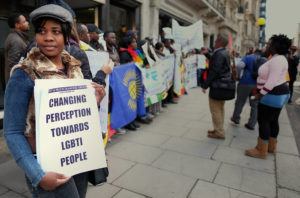Emily is a 20-year-old woman who I met in Kenya’s capital, Nairobi last year. I was there to film a documentary on the western import of homophobia. While there, my crew and I enjoyed the delicious mandazi she prepared. She said chores like cooking gave her much joy while growing up. And this nostalgia is rooted in her being far away from home. Emily hails from Goma, the Democratic Republic of Congo. She now lives in Kenya as a refugee.
Emily did not leave her hometown to escape rebel fighting or erupting volcanoes as some labels call it the most dangerous city, but the violent stigmatisation that she faced as a trans girl in a largely queer-unfriendly country. Even though the DRC has no legislation that criminalises same-sex relations or targets sexual minorities, it also offers no protection for these vulnerable groups. Violence can come from the family, community, state perpetrators like the police and non-state actors in the part of the country where militias challenge the government for territories.
Emily was 11 when her parents kicked her out of her home, and her grandmother took her in. Her queerness was intolerable for her parents. At the age of 14, she was physically assaulted by people at a market. When the police arrived at the scene, they illegally detained her for two days. Upon her release home was no longer home. Her grandmother told her that she did not want trouble with the community and therefore, Emily had to leave her second home.
From there on she stayed with friends until 2016 when she met a Kenyan man who worked in Congo. She confided in him, and he suggested taking her along to Uganda. Emily didn’t hesitate, she got on the road to Uganda, aged 16. Even though she had no travel documents, it caused no stir with immigration officers as the man, travelling in a company car, presented her as his child. “You pay people money to pass if you have no documents,” Emily narrates.

In Uganda, she looked forward to continuing her education. In fact, she had left DRC dressed in her school uniform. “Until now I have my school sweater,” she adds nostalgically.
Upon reaching Uganda, however, the man who had helped her escape travelled often outside the country, provided accommodation and took care of her material needs, but could not commit to cater for her education. Desperate, she was advised that by going to Kenya as a refugee, a term that she heard then for the very first time, she would be assisted. She left Uganda after 6 months and with the help of the Red Cross, she ended up in Kakuma Refugee Camp in northwestern Kenya.
Kakuma was “hell” for LGBTQI+ people, and for two years Emily lived through this as a teenager. She decided that she would not settle in this queerphobic camp, where the lives, especially of trans people, are under constant scrutiny and danger from attacks. Last year the African Union held its 32nd Ordinary Summit in Addis Ababa under the theme: “Year of refugees, returnees and internally displaced persons”. This aimed at putting a spotlight on displacement and offer solutions. As of 2019, Africa hosted over one-third of the global forced displacement population. That same year, Emily joined a desperate small team of refugees who left from Kakuma to try their luck at a UN Refugee Agency run facility called Sherkole camp in Western, Ethiopia.
They had heard rumours that Sherkole was a less hostile camp, with better treatment than Kakuma. However, their hopes were dashed almost upon arrival, where they were not even given shelter or essential items such as blankets or household materials. Except for one woman who kindly housed the group while they waited for UNHCR to attend to them, they were almost immediately met with anti-queer sentiments. Within three weeks, a hate-filled mob gave the newcomers 24 hours to vacate the camp or else face the consequences.
Fearing for her life, Emily made her way back to Kenya, that’s a more than 2000 kilometres journey.
She currently resides in Nairobi. Nonetheless, she is still not safe. According to her, UNHCR, the humanitarian agency charged with the care of refugees, often ignores the plight of queer refugees, whether in Nairobi or in Kakuma. She claims staff members would rather call the police on those protesting for better treatment. “This comes with a lot of brutality. They use extreme force.”

The suicide of a 28-year-old gay refugee, Aneste Mweru, in April 2020 symbolises the failure of humanitarian and state actors to care for the lives of queer refugees. Mweru had gone to the UNHCR offices in Nairobi to seek help, as he was desperate for food. The police arrived and beat him up, after that he left just to return later and hang himself from a tree outside the aid agency’s offices.
As a trans woman, Emily rightfully fears police interaction, knowing that they are often a threat for LGBTQI+ people. Generally, Kenyan police brutality is widely known with many reported extrajudicial killings that in July, hundreds of Kenyans took to the streets to protest. Homophobia, transphobia is a reality in Kenya and double that with one’s foreignness as a refugee, this puts Emily and many others in a very vulnerable place every day. In May 2019, Kenya’s High Court unanimously ruled that the country’s own British-era penal code against unnatural acts, adopted into law at Kenya’s 1963 independence, does not violate the country’s 2010 constitution.
In May 2020, Kenyan police raided a trans refugee safe house in Nairobi and charged the residents for not adhering to social distancing protocols – in their own home. Posing a severe health risk to the refugees during a pandemic, officers violently entered the home, rummaged through people’s official files, turning the house upside down. The refugees were beaten with metal rods and told that they belong at Kakuma Refugee Camp. After the illegal search and subsequent arrest, Vanilla, an activist who suffered this harassment, informs me that the police always try to solicit bribes through such arrests. Emily says that people in the neighbourhood further exacerbate these injustices by extorting the trans community with threats of calling the police on them.
The denial of rights and continued dehumanisation of LGBTQI+ Africans is a stain on this continent’s conscience.
That Africans have to live as refugees on this continent because of their gender expression and sexuality is a shame. It is a violence that most leaders and institutions okay and actively uphold. The coronavirus pandemic has been used as a cover to further victimised LGBTQI + Africans.
Now more than ever, we need to see a humane response to the plight of people like Emily. It’s not enough for the AU to declare a year of refugees when refugees like Emily are excluded. From family members to aid agencies and state apparatus, the toxic cisheteropatriarchy that continues to deny many a dignified life must be checked. Our liberation is largely unfinished, and the road continues to meander as many regurgitate colonial oppressions on bodies of gender and sexual minorities on the continent.
Namupa Shivute is a freelance writer, documentarian and activist residing in her/their home country, Namibia. Their work has appeared in the Southern Times, Observer Connect, redfish media and gal-dem magazine. Namupa’s 2019 redfish film “Sodom & Gomorrah” centers the oppression of LGBTQI+ communities of Uganda.

I m very sorry